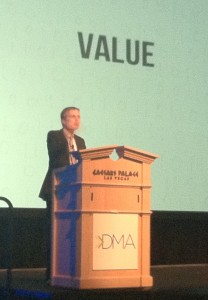 The value of big data has less to do with the sheer quantity of the data, and is more about an opportunity to take a new view of the world. That's the thought that Viktor Mayer-Schonberger, the Oxford University Professor known for his expertise on big data shared in his keynote session at the NCDM 2013 Conference, organized by the DMA.
The value of big data has less to do with the sheer quantity of the data, and is more about an opportunity to take a new view of the world. That's the thought that Viktor Mayer-Schonberger, the Oxford University Professor known for his expertise on big data shared in his keynote session at the NCDM 2013 Conference, organized by the DMA.
Because the increasing quantity inherent in big data can lead to a new quality, he believes the right approach for marketers is to step out of our comfort zone and to get a different perspective. Using the notion of focus as a perspective in photography, he illustrated the pitfalls of taking a “little data” view of things and the risks involved with that approach – notably the way you lose key pieces of information outside of the focus and how you might literally miss the “big picture” (and therefore either the big risks or the big opportunities). In addition to the obvious need for marketers to get comfortable with data-driven processes and make use of marketing analytics, what I heard was a call to be aware of perspective and the need to actively engage imagination and creativity as we think about strategy. We simply need to start thinking differently because of big data.
His idea of a “little data” approach is how statisticians have traditionally managed the inability to handle big data by sampling - testing on small data sets and then extrapolating to large populations. By contrast, big data means we can collect and analyze far more information on anything than ever before. The big data approach is to “let the data speak for itself” by using all the data (and not sampling subsets) because you may find outcomes and conclusions that are more numerous and also ones that are unexpected.
With this quantity of data, also comes with a certain degree of messiness, evidenced by the large amount of unstructured data we’re often dealing with, such as from social media and other text. And while it’s messy, it’s equally relevant, so ignore it at your peril. As Viktor brought his presentation to some key takeaways, I thought the most impactful one for marketing was the idea of letting go of predefined categories to focus on the individual. That potential from big data comes at the same time when consumers are increasingly expecting personalized experiences
Suddenly the idea of targeting “Soccer Moms” seems so passé
and that's because it is.
We marketers can do better – and we certainly should. For another powerful example of how different a big data mindset is, consider a simple coin toss – it’s a 50-50 chance of coming up heads or tails, right? Not necessarily so – in the world of big data 50-50 is too simplistic a view. What if you could account for which side was up at the beginning? How about how much force was put into flipping the coin. These are all factors that can now be quantified and modeled. At the end of the day, who cares about a coin toss? But what if you apply that same idea to a business decision like deciding which offer should be given to customer segments that self-identify with their web behavior?
Analytics such as marketing optimization can help you make a confident, informed decision that’s better than simply asking what you did the last time. Embracing the analytics of big data and all the processes and mindsets that go with it means your individual marketers and all the work teams that make your organization are growing professionally in ways that have measurably positive impacts.
In the coin toss example, you learn from every toss as you flip the coin. You learn about you, and also about the coin, while keeping the previous tosses into account. In Viktor’s words, it’s moving from a Boolean world of binarity to a Bayesian world of constant learning, and we move away from shortcuts to a world in which we embrace the complexity of the environment. As we embrace the complexity of big data, we also have a responsibility to treat data carefully. Since so much of big data is customer data, the question of privacy and the risk of creepiness looms large.
Viktor’s closing thought about big data and marketing is that we should preserve our ability to be human and resist the urge to be so predictable. In the future, we may find that serendipity, or the ability to deliver the unexpected, will become more valuable. I like his thinking.
Stephanie Miller, VP of Member Engagement at the DMA also wrote a blog post on Viktor's keynote session at the DMA Advance blog and highlighted other parts of his presentation. What are your thoughts?

1 Comment
Pingback: Live From NCDM13: The Marketing Value of Big Data is a New Perspective | DMA Advance